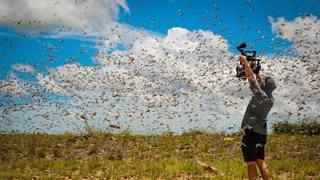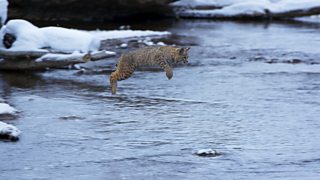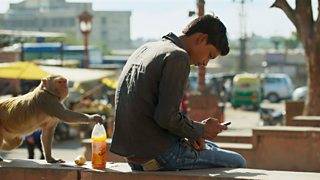This weekend the 主播大秀 Natural History Unit's landmark series Planet Earth returns for a new series. Creative Director Mike Gunton reflects on his inspiration for telling the story of the natural world.
I remember when I was about 13 years old my school’s biology department had a little pond at the back. It was spring and the biology teacher suggested that a friend and I should go and look at the new baby frogs in the pond. Of course we started trying to catch them and I remember holding one in my hand thinking how tiny they looked.
Looking back I think my fascination with nature started in that moment – the idea that hidden away in this pond – un-seeable to the majority of us – was a heaving mass of beautiful tiny, tiny frogs.
Then when I was a bit older and got my first camera, I realized that a camera could show things the human eye couldn’t see. In a way those little frogs have been my inspiration - trying to show other people the ‘un-seeable’. That’s what I try to do today, giving audiences a chance to see what they wouldn’t or couldn’t normally get to see.
If I had to tell someone what I do I’d describe myself as a filmmaker. My job is to come up with ideas, get the ingredients together and then work with my colleagues to turn those ideas into the best TV programmes we can.
Those programmes – those made by the 主播大秀 Studio’s brilliant Natural History Unit – have over the years been pretty successful. But the job has two sides to the coin. I think, in some ways the business of filming nature is a serious one - filmmakers are trusted to deploy enormous resources and work in challenging environments, often very remote, out of contact from any help.
We’re having to be responsible – there’s a lot at stake. On the other hand, as storytellers we’re also trying to keep a lightness when trying to reveal and communicate the wonder of nature. It would be all too easy to be a bit grand or pompous about it all. We can’t do that. It’s quite a juggling act.

I think the key to the Natural History Unit’s success is that it’s always evolving, we learn from each other, sharing experience and knowledge in a way that’s unparalleled. It’s also very broad - we’re given permission to employ different techniques to tell a huge range of stories - I have my approach to telling stories about the natural world, others have a different approach. In fact we not only have the permission to tell these stories in different ways but I think a duty as well. I personally don’t think there are many organisations which can claim that breadth of coverage and approach.
If you ask me what the has changed since the first Planet Earth and Planet Earth II - and so how they are different - I think for me there are at least three things.
The first is filming technology – over ten years - partly stimulated by original Planet Earth, there have been a whole series of programmes have lit the fires of technical innovation. The extraordinary development in technology, whether its drones, miniaturisation, new gyro stabilized handheld cameras or remotely operated cameras, we have been able to bring them together in this one series to draw back the veil of secrecy the shrouds the natural world.
Secondly, in the last 10 years there seems to have been an extraordinary upsurge in scientific investigation into the natural world. Not only that, the wealth of information is being so much more readily shared - scientists are shooting their own video, taking photos, posting stories so new knowledge is not only ever advancing but easier and quicker to access.

Thirdly, the sense of the fragility of the natural world is becoming more and more front of mind– we’re more and more conscious of that compared with even 10 years ago. Our experience in making this series was often underscored by a sense of human encroachment into the natural world and the peril that can bring. There are of course some encouraging reversals where we’ve seen enlightened conservation policies in places that were previously looking like they were heading for trouble – but the trend feels it’s going the wrong way for nature. We felt that needed some acknowledgement in the series. Coupled with that we also felt we needed to feature a habitat that wasn’t featured in the original Planet Earth - the one built by humanity. So we’ve one episode on cities and the animals that share the urban world with us. It’s an amazing film, beautiful and thought provoking at the same time.
And if I can have an additional difference to my list of three – there’s a difference in execution. The original Planet Earth had the sense of observing the planet from almost a god-like perspective. It was at the time a unique and powerful perspective. In the new series we’re looking at the world - the environment - through the animals eyes: and now we can run, swim and fly with them. Its very involving and I think brings home both the drama of their lives and their relationship with the habitat where thy live. And that in itself a reflection of the technical innovation which has occurred during the intervening years.

The worldwide impact of Planet Earth is almost incalculable. Wherever I go in the world people ask “Were you involved in Planet Earth?” It’s such a brilliant name for a start, its so evocative yet so simple. The first series came at the right time, at a point where I think people felt a need to reconnect with the planet. I’m hoping Planet Earth II will tap into a similar Zeitgeist - one that feels in the air right now.
Planet Earth is reckoned to have been seen by half a billion people. Now, thanks to our new co-production partners in China, I’m hoping even more people will watch the new series. I think China is the place in the world where the new series could have the most impact. The opportunity to reach astronomical numbers of people is a great opportunity.
When I was sitting by the pond trying to catch those frogs I never thought for a moment I would be working on something that could have the potential impact of Planet Earth II. Trying to entertain and inform such huge numbers of people is a big challenge, but the prospect doesn’t frighten me – ok, it might be a bit daunting - but it sort of fires me up - it’s definitely exciting.
Mike Gunton is Creative Director, 主播大秀 Studios Natural History Unit
- Planet Earth II on 主播大秀 One at 8pm on Sunday 6 November 2016
- exclusive interviews with the production team on the 主播大秀 Media Centre website
- how 主播大秀 Outreach gave Bristol media students the opportunity to make their own wildlife documentaries
